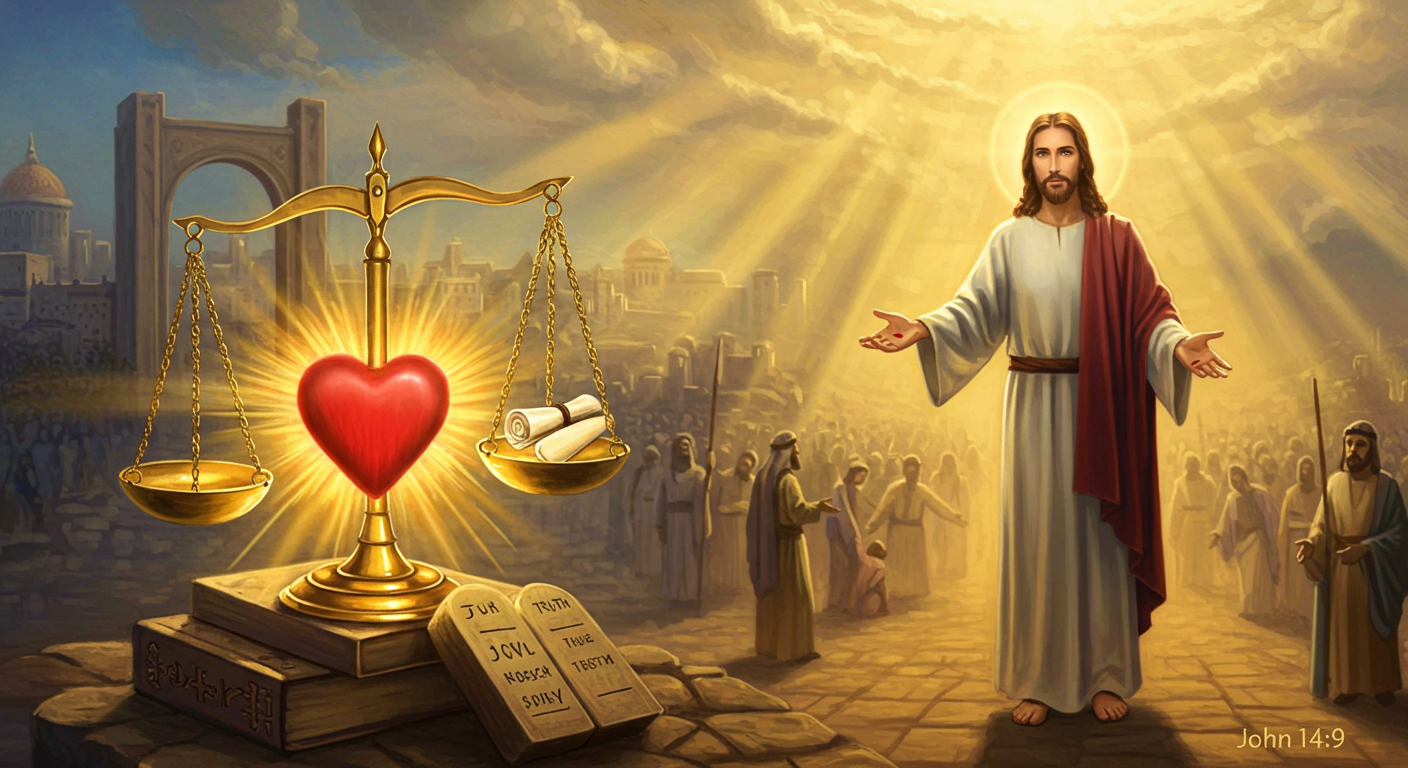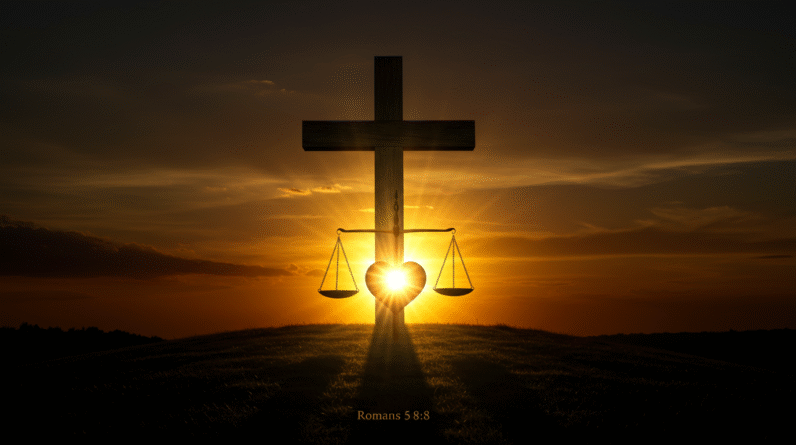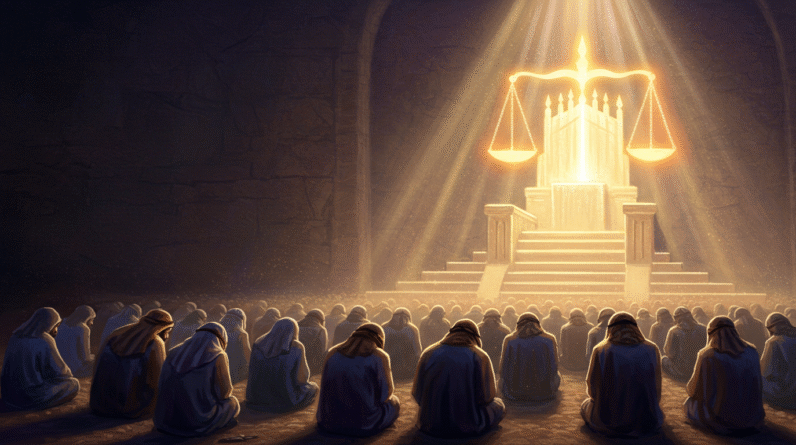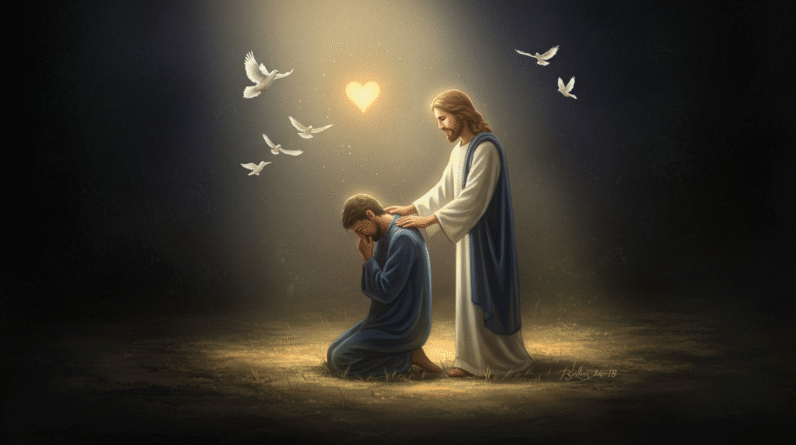obedience.
Love And Justice In The Law (Zechariah 7:9)
You’ve come to a short, powerful sentence from the prophet Zechariah that strikes at the heart of how God wants you and your community to live: “Administer true justice; show mercy and compassion to one another.” See Zechariah 7:9. That command is simple, but it reaches into every room of your life — your church, your family, your neighborhood, and the public square. In what follows, you’ll walk through the meaning, the biblical context, and the practical implications of God’s call for both love and justice in the law.
The Immediate Context of Zechariah 7
You need to know where this sentence sits. Zechariah 7 grows out of a question the returned exiles asked: Should they continue fasting in the fifth month as they had done during earlier years of mourning? The people wondered if ritual practice alone pleased God. The prophet’s response reframes the issue: God isn’t content with religious forms when they aren’t connected to righteous living and compassion. Read the scene in context at Zechariah 7:1–7.
As you read, notice how God’s answer moves from ritual to relational reality. The Lord, through Zechariah, presses the people to consider their treatment of one another — to administer true justice and to be merciful. That pivot teaches you that God’s worship is judged by how you treat others, and that law and love are not opposing forces but complementary obligations.
“Administer True Justice”: What the Law Requires
When you read “administer true justice,” you’re hearing a call that runs deep in the covenant tradition. The law of Israel established a structure for justice — judges, appointed leaders, and principles that protected the vulnerable. You see this pattern in instructions such as Deuteronomy 16:18-20, where God tells you to appoint judges who will not pervert justice, who will pursue what is right and fair. Justice is not optional; it’s institutional and personal.
Justice is not only about courts. It is a habit of public life and private conscience. It protects widows and orphans, the alien, and the poor. When you examine Scripture, you’ll see God repeatedly identify with the marginalized and command his people to do the same. Justice, in the biblical sense, is textured with righteousness — it’s the right ordering of relationships under God’s rule.
“Show Mercy and Compassion to One Another”: The Law’s Heart
The second half of Zechariah’s command, “show mercy and compassion to one another,” reminds you that legal correctness without a tender heart is hollow. Mercy is a deliberate choosing to act with kindness and forgiveness. Compassion is feeling the pain of another and responding. The prophets press this truth again and again: right ritual without righteous behavior is rejected. Consider Isaiah 1:17 — “Learn to do right; seek justice. Defend the oppressed. Take up the cause of the fatherless; plead the case of the widow.” Mercy and justice are woven together.
You’ll also find the moral summary in songs and wisdom phrases like Psalm 85:10: “Love and faithfulness meet together; righteousness and peace kiss each other.” That poetic image should form your imagination: where justice rules rightly, mercy flourishes; where mercy is given, justice finds its fulfillment.

How Love and Justice Interact Throughout Scripture
If you want a roadmap, trace the Bible from Genesis through Revelation, and you’ll see a consistent theme: God’s holiness demands justice, and God’s love moves toward mercy. The two are not enemies but partners in God’s redemptive plan. When you hold them together, you reflect the character of God.
Jesus’ summary of the law gives you the core. He tells you to love God and love your neighbor as yourself — that sums up the law and the prophets. See Matthew 22:37-40. Loving your neighbor will necessarily involve both mercy (doing good to those in need) and justice (standing against oppression and deceit).
Jesus, the Fulfillment of Law and Mercy
You need to understand how Jesus reframed the law. He didn’t abolish it; he fulfilled it, showing you what the law was meant to produce — a heart surrendered to God and a life that seeks the good of others. Read his declaration in Matthew 5:17. Jesus models what justice looks like when tempered with mercy: he heals, he forgives, and he convicts hypocrites who neglect the weightier matters of the law.
In the parable of the Good Samaritan, Jesus answers the question “Who is my neighbor?” by showing that mercy knows no boundary of ethnicity or religion; it crosses social lines to meet human need. See Luke 10:25–37. In that story, you find the law’s impulse: love that is active and sacrificial, and justice that protects the weak.
The Prophets: God’s Law as Social Ethics
You’ll notice the prophets are more concerned about social ethics than temple ritual when those rituals become empty. Amos thundered against worship that divorced worshipers from justice: “Let justice roll on like a river, righteousness like a never-failing stream.” See Amos 5:24. When people used religion to hide exploitation or to ignore the poor, the prophets called them to repent.
Isaiah speaks of fasting that pleases God as loosening the chains of injustice and feeding the hungry: Isaiah 58:6-7. You begin to see a pattern: God’s law intends a society where mercy and justice are daily realities, not theological abstractions.
Why Both Love and Justice Matter to You
Now think of your own life. If you emphasize justice without mercy, you cultivate legalism, harshness, and alienation. If you emphasize mercy without justice, you risk tolerating wrongdoing and ignoring the needs of the vulnerable. God calls you to hold both: righteousness with tenderness, truth with mercy.
The apostle James warns you that faith without deeds is dead; loving your neighbor produces action. See James 2:8-9. Your faith must be visible in the way you pursue fairness and offer compassion. This is not a minor theme; it’s central to the Christian witness.
When Love Requires Righteous Judgment
There are times when love requires you to make hard judgments. Discipline, correction, and sometimes calling out injustice are acts of love when they are motivated by redemption rather than pride. Paul told the Corinthians to remove a destructive influence from the church in order to restore holiness, illustrating that protecting the community can be an expression of tough love. See 1 Corinthians 5:12-13.
Righteous judgment is not vengeance; it is corrective. It aims to restore, prevent harm, and uphold truth. You must exercise it with humility, always guided by love.
Loving Your Neighbor in Personal and Public Life
How does this look in everyday life? It shapes your interactions with neighbors, your choices at the ballot box, your participation in civic institutions, and your church’s ministries. The Bible’s ethic is not private; it’s public. Micah’s clear call invites you: “Act justly, love mercy, and walk humbly with your God.” See Micah 6:8.
You’ll find guidance in Paul’s moral exhortations about how Christians should live together, love their enemies, and bless those who persecute them. See Romans 12:9-21. Love shapes your politics, but it must always be governed by truth and a commitment to the flourishing of others.
Practical Steps: Translating Zechariah 7:9 into Daily Life
You may wonder: how can you live out Zechariah’s call in practical, measurable ways? Here are concrete pathways that connect justice and mercy in your daily rhythms:
- In the church: Advocate for transparent processes, protect the vulnerable, and create ministries that serve those in need. A congregation that worships rightly will also act justly.
- In your workplace: Treat colleagues fairly, protect those in weaker positions, and speak up when exploitation occurs. Justice here may mean advocating for fair pay and humane policies.
- In your neighborhood: Look for lonely elders, lost children, or struggling families and offer help — not as a one-off but as a neighborly commitment.
- In public life: Vote, volunteer, and advocate for policies that protect the disadvantaged and promote the common good, guided by biblical principles.
These are not exhaustive, but they are practical steps you can take to ensure that love and law are joined in your life.
Small Steps That Add Up
You don’t need a grand program to begin. Start with simple acts: visit an older person, mentor a young person, give to a fund that feeds the hungry, or serve in a legal aid ministry. When the habit of mercy forms in small actions, you’ll find the courage to address systemic injustice.
When you act, do so with humility and prayer. Ask God to show you where your heart needs change — where you may have favored comfort over compassion, or legalism over grace.
Teaching This Passage in a Bible Study
If you’re leading a group, Zechariah 7:9 makes an excellent study for pressing the difference between ritual and righteousness. Here’s a simple lesson framework you can use in your small group or personal study:
- Read Zechariah 7:1–9 aloud and let the image of God’s judgment on empty worship sink in.
- Compare Zechariah’s words with Jesus’ summary of the law: Matthew 22:37-40.
- Discuss contemporary parallels: Are there practices you see that have become empty forms? Where might your community need to move from ritual to justice and mercy?
- Pray for eyes to see the vulnerable and courage to act justly and mercifully.
Study questions you can pose to your group:
- Where have I mistakenly thought ritual or routine was sufficient in my spiritual life?
- Who are the marginal people in my community that I can serve or advocate for?
- What institutional or personal changes would better reflect God’s call to justice and mercy?
These questions help turn conviction into action.
The Danger of Separating Love and Law
You must beware of two false extremes. Some separate God’s love from his holiness, assuming mercy cancels out the need for justice. Others elevate justice into cold legalism, dismissing mercy as weakness. Scripture refuses both errors. In Psalm 85:10, you read again that “love and faithfulness meet together; righteousness and peace kiss each other.” The proper Christian posture is to pursue both.
When you live out both, you testify to the world that God’s law doesn’t crush the human spirit but restores it. You show that God’s love is not indifferent to wrongdoing, and that his justice is not devoid of grace. That balance produces communities where people flourish.
Repentance and Reform: The Church’s Responsibility
Remember Zechariah’s original rebuke was a call to repentance. You can’t simply rearrange programs and call it reformation; change begins with the heart. The churches that move rightly will repent of neglect and wrongs, seek God’s face, and then reform their practices to protect and serve others.
Repentance leads to practical reform: transparent governance, restitution where possible, protection for the abused, and generosity in feeding and sheltering the poor. When your church takes these steps, you embody the law’s intent and the gospel’s power.
Hope in Christ: Where Justice and Mercy Meet
At the center of the Bible’s story, you find a God who is both just and loving in the person of Jesus Christ. Sin required justice; God provided mercy through the cross. You can read Paul’s explanation of God’s justice and justification in Romans 3:23–26. There you’ll see that God’s righteousness and his mercy converge in the work of Christ. The cross is where divine justice and divine love meet.
This theological truth has practical consequences for you: because Christ has satisfied God’s righteous demands and offered you mercy, you’re freed to pursue justice without falling into self-righteousness. You can act for the good of others out of gratitude, not fear. You can forgive because you have been forgiven. You can stand against injustice because you are committed to the God who restores.
The Holy Spirit Empowers Your Witness
You are not left alone to carry out this calling. The Spirit equips you with compassion, courage, and wisdom to act rightly. As you yield to the Spirit, you will find new sensitivity to the needs of others and new boldness to speak truth in love. Scripture calls you to be a people marked by love that is active and justice that is steadfast — a living demonstration of the gospel.
A Final Appeal: Live the Law of Love
If you take Zechariah’s small sentence to heart, your life will be different. You’ll worship with repentance. You’ll serve with humility. You’ll speak for the voiceless and love the neighbor who is difficult to love. The law is not a burden but a guide toward life in God’s world.
Remember Jesus’ command to love God and neighbor; remember the prophets’ insistence that true religion cares for the poor. Walk in those ways, and you’ll reflect the God who is just and merciful.
Closing Prayer and Invitation
Would you bow your heart with me now in a moment of quiet prayer? Ask God to open your eyes to where you’ve hardened your heart, to give you courage to act justly, and to fill you with a compassion that compels you to serve. Ask Christ to form in you a love for the lost and a grief for injustice that moves you to action. The Lord hears such prayers, and he will answer as you walk in obedience.
If you have never trusted Christ as your Savior, you should know this: the justice you cannot meet is met in him. Turn to Jesus, and you will find mercy that changes you from the inside out — mercy that will also send you out to do justice in his name.
If you’d like to continue this journey, gather a few friends to study Zechariah 7 together, pray for opportunities to serve in your community, and ask God to help you live out both love and justice.
Explore More
For further reading and encouragement, check out these posts:
👉 7 Bible Verses About Faith in Hard Times
👉 Job’s Faith: What We Can Learn From His Trials
👉 How To Trust God When Everything Falls Apart
👉 Why God Allows Suffering – A Biblical Perspective
👉 Faith Over Fear: How To Stand Strong In Uncertain Seasons
👉 How To Encourage Someone Struggling With Their Faith
👉 5 Prayers for Strength When You’re Feeling Weak

📘 Jesus and the Woman Caught in Adultery – Grace and Mercy Over Judgement
A powerful retelling of John 8:1-11. This book brings to life the depth of forgiveness, mercy, and God’s unwavering love.
👉 Check it now on Amazon
As a ClickBank & Amazon Affiliate, I earn from qualifying purchases.
Acknowledgment: All Bible verses referenced in this article were accessed via Bible Gateway (or Bible Hub).
“Want to explore more? Check out our latest post on Why Jesus? and discover the life-changing truth of the Gospel!”








